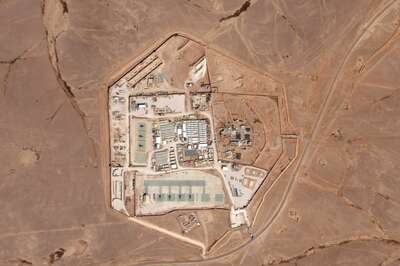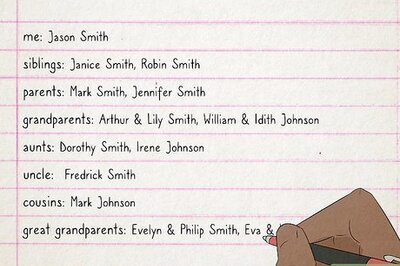
views
Alright in Alexandria
The receptionist has throat cancer and must keep a finger on the tiny hole at the top of his chest when he speaks, "Welcome to..." and as his fingertip slips there's a deflated wheeze instead of "Alexandria". My room is one of those typical budget accommodations with a 'sideways sea view', meaning that I glimpse a strip of the Mediterranean from behind the back of the more posh 1920s' Hotel Cecil (where a literary hero of mine, Somerset Maugham, once stayed). My head is boiling over with preconceived imagery of the colourful city.
"A fecund desert of human loves littered with the whitening bones of its exile," wrote Lawrence Durrell in his Alexandria Quartet. Michael Palin referred to it as "Cannes with acne". EM Forster confessed, "It is only at sunset that Egypt surpasses India - at all other hours it is flat, unromantic, un-mysterious and godless." Perhaps the last time anybody said anything nice about Alexandria was in antiquity when Strabo described a magnificent city that rivalled Rome itself.
Each was, of course, motivated by his times. The Roman geographer Strabo, for example, moved to Alexandria to work at the famous library in the 20s BCE, shortly after Cleopatra's suicide, when Egypt was added to the Roman kitty. He described the licentiousness of the Ptolemies that ruled prior to the takeover, everything that Egypt had to offer from Nile fishes to barley beer, and how Alexandrian streets were crowded with Ibis birds - a great nuisance. The British wits had their agendas too, as their empire had a commercial and strategic interest in the Suez Channel. So Forster was a Red Cross volunteer in the First World War and Durrell a press attaché during the second. Forster wrote the intriguing Alexandria: A History and a Guide (1922), which concerns itself with the sights that aren't visible to the eye, or as he said, "I'm constructing by archaeological and other reading an immense ghost city." Durrell described the city's underbelly and his four novels are understandably not so popular here; none of the bookshops I visit have copies.
Forster's guidebook project seems to have been a bit of a cover so that he could stalk a handsome tram-conductor, travelling miles by night trams, hanging around the Ramel Station hoping for a glimpse of Mohammed. Eventually the affair bloomed to be the only full-fledged one he ever experienced. Towards the end, Mohammed fell ill with consumption (and died in 1922). Forster - keeping one tram-ticket as a cherished memento - returned to Dewas, in present-day Madhya Pradesh, to work on his masterpiece A Passage to India. One of the central characters in the novel, Aziz, is apparently based on the tram-conductor.

Poolside Menu Shooting pools at the foot of the fabled lighthouse in Alexandria
Apart from British writers, the 'fecund desert' of Alexandria attracted tens of thousands of Italians, Greeks and Jews as well as people from all parts of the crumbling Ottoman Empire, in a rare mix of east and west. There was a strong French connection too, discernible today in the francophone shop signs. The chanteuse Edith Piaf came in 1949, entertaining the French community, hanging out at Elite, the old-fashioned bar standing on the wedge-shaped corner on Safia Zaghloul Street.
The 1952 revolution changed all that. The nationalisation of the Channel led to the Suez Crisis and a heavy-duty stand-off between Egypt, Israel, France and Britain, resulting in the expulsion of foreigners; so now, that Alexandria too - the open cosmopolitan city - primarily exists in the mind.
Ancient Alexandria's library was supposed to collect the knowledge of the world (it even housed ancient Indian manuscripts), an early offline version of Google Books. Forster also tells us that its employees had to serve the Ptolemaic royals by writing elegies to order. Which sometimes presented delicate problems, like when the bald queen Stratonice asked for a poem praising her hair. The library is long gone, burnt down book by book by various invaders; today's modern replacement is flashy, but not half as exciting as the idea of the original.
The grand lighthouse, in its day the tallest tower in the world (taller than the UB Tower in Bangalore today), was visible 50 kilometres out to sea. It collapsed in the 14th century and was last seen by Ibn Battuta. The causeway that connected the mainland to the island of Pharos has silted over into a peninsula, and in its quaint al-Anfoushy neighbourhood you find the best seafood joints. Topmost is Ahmed Elaa's Fish Restaurant, run by Ahmed's descendants, right next to the fish market. You pick your fish from their own shop (rate as per weight), and then sit down to drool while the meal is cooked. At a bakery where I saw all customers feasting on deadly-looking meat pies, the old-fashioned baker sent me to the old-fashioned butcher next door to get the mince: Even the pies here are assembled in a pre-modern DIY fashion.


















Comments
0 comment